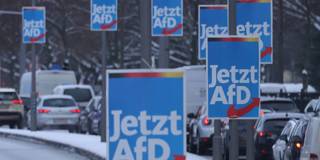Since the end of the Cold War, Germans were spared from having to decide between competing visions of their country’s role in Europe, NATO, and the wider world. But with the rapid rise of radical parties advocating reckless domestic and foreign policies, the choice confronting voters this year could not be more consequential.
BERLIN – For years, German foreign policy was rarely a domain of fierce debate over fundamentally different alternatives. Since reunification (1989-91), Europe’s largest country and strongest economy has defined its foreign policy in terms of European and transatlantic relations, implying ever-deeper anchoring within the European Union and NATO. In practice, this meant outsourcing German security to the transatlantic alliance, disinvesting militarily, and concentrating on boosting the country’s economic power.

BERLIN – For years, German foreign policy was rarely a domain of fierce debate over fundamentally different alternatives. Since reunification (1989-91), Europe’s largest country and strongest economy has defined its foreign policy in terms of European and transatlantic relations, implying ever-deeper anchoring within the European Union and NATO. In practice, this meant outsourcing German security to the transatlantic alliance, disinvesting militarily, and concentrating on boosting the country’s economic power.